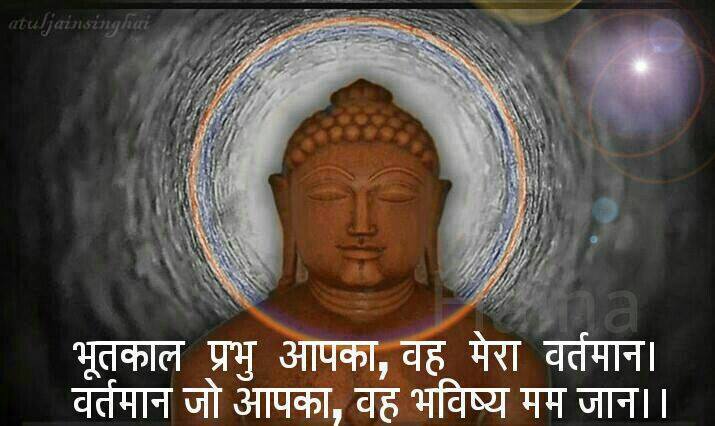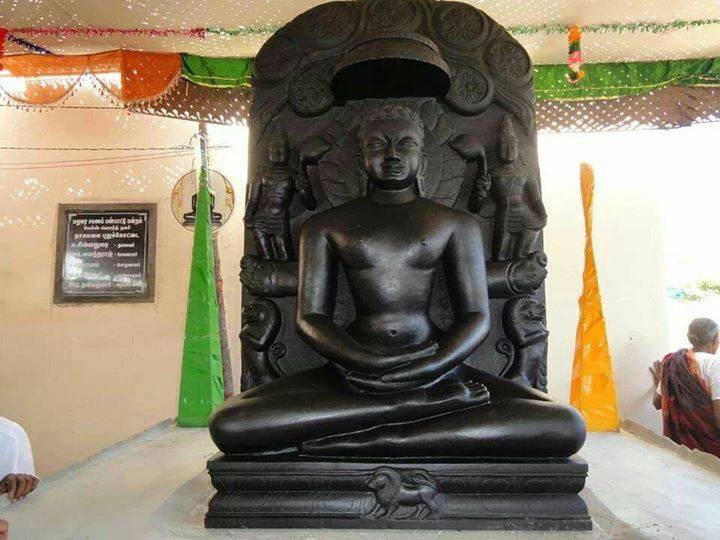Update
 Source: © Facebook
Source: © Facebook
''If you can remain detached, No matter what the event, You have learn't the way of Lord Mahavira, And won over life and death!'' we do pray intensively to be ornate with three jewels. Rational Perception, Rational Knowledge and Rational Conduct [Gem-trio - United constitute] the path to libation.
आओ... दिवाली पर वीर प्रभु निर्वाण को स्मरणोत्सव के रूप में मनाये,
पटाको से जीवो को नहीं, ज्ञान-दीप से आत्मा को सजाये व् कर्मो जलाये!
आओ... गणों में ईश [गणेश-गणधर] के केवलज्ञान की भव्य पूजा रचाए,
धन लक्ष्मी की नहीं, केवलज्ञान और मोक्ष लक्ष्मी की भावना भाए!
Divali [splendor of lamps] in Jainism is the jubilation to commemorate the salvation, According Harivansa Purana, Tirthankara Mahavira Swami had attained Nirvana just before the dawn of the Amavasya (new moon, early next morning) and According to Uttara Purana, The chief disciple of Mahavira, Gautama Svami Ganaghara also had attained complete knowledge or enlightenment (Kevalajnana) on this day in evening [dusk time]. Thus, the making Divali one of the most important Jain festivals.
On that day Mahavira attained emancipation and relinquished this universe forever. He sat on the salvation. He will never return from there. His emancipation caused extinguishes of Bhav Deepak [darkness] and turned the atmosphere into darkness and hence those who were present at that time lighted Dravya dīpaka [clarified butter’s lamp]. Dipavalee festival since then commenced for Jains. It is celebration of Nirvana of Tirthankara Mahavira and Kevalajnana of mahavira chief disciple Gautama Ganadhara. It is not an enjoyment of worldly pleasures, isn’t it? We also have to wish get salvation as early as can break the karmic bondage.
Dipalika roughly translates as "light leaving the body". Dipalika, which can be roughly translated as "Splendiferous light of lamps", is used interchangeably with the word "Divali".
Divali is the first referred in Harivansa purana written by Acarya Jinasena as dipalika (splendour of lamps). In his words the gods illuminated Pavagiri by lamps to mark the occasion. Since that time, the people of India celebrate the famous festival of Dipalika to worship the Jinendra (i.e. Lord Mahavira) on the occasion of his Nirvana: As Acarya Sri Pujyapada svami mentioned in the Nirvana bhakti - Tirthanakra Mahavira had break the all karmic bondage and attainted Nirvana from Jala-mandira, Pavapuri nagara, Bihara Pranta. Dipak is a symbol of light of attainment of enlightens & we’ve to abolition of darkness fascination to get complete knowledge.
SOURCE: Article compilation by Nipun Jain ÉUphorič [ with taking transpiration from various magazines ]
News in Hindi
 Source: © Facebook
Source: © Facebook
✿ मेरे भावो की माला मोक्ष-मार्ग शिल्पी महावीर स्वामी के निर्वाण कल्याणक पर गुणानुराग में, मेरा खुद का बनाया हुआ भजन, मेरे कुछ भावो को समेटे हुए.....
--------------------------------------------------------------------------------
महावीर स्वामी बसों नयन मेरे, तेरा वंदन काटे भव-बंधन मेरे! महावीर स्वामी...
तू त्रिशला की गोद से जन्म था स्वामी, जियो और जीने दो, सबको बताने!
तू अहिंसा का पुजारी, वात्सल्य जगाता, सब जीवो को एक सामान बताता!
तेरी वाणी से कितने तर गए हे स्वामी, तेरे दिव्यवाणी है मोक्ष नसैनी!
मोक्ष मार्ग नेता महावीर स्वामी, आपको ह्रदय में रख मैं नमामि!
तेरस से तेरा जीवन धन्य हुआ है, चतुर्दशी को ब्रम्ह में लीन भया है!
अमावस्या की प्रातः बेला में स्वामी, तू हो गया सिद्ध-शिला का निवासी!
संध्याकाल में गौतम गणधर ने पाया, केवलज्ञान से अंतर को जगाया!
वीतरागता का मैं कायल हुआ हूँ, तेरी इस छवि का दीवाना हुआ हूँ!
जियो और जीने दो सबको बताया, प्रकट में गाय-सिंह एक घाट पर आया!
रत्ना-त्रय को मोक्ष मार्ग बताया, अनेकान्तवाद से वैष्म्यता का अंत कराया!
तेरे गुण जन्मान्तर मैं गाता रहूँगा, मोक्ष-मार्ग शिल्पी का मार्ग अपनाता रहूँगा!
मोक्ष परम पद पाने को महावीर स्वामी, तेरे चरणों में शीश झुकता रहूँगा...
..........आचरण प्रतिक चरण नमाता रहूँगा...नमाता रहूँगा...नमाता रहूँगा!
Composition by: Nipun Jain ~ Wish you all very happy Diwali
♫ www.jinvaani.org @ Jainism' e-Storehouse, Have DharmaLabh!
----------------------------------------------------------------------------
